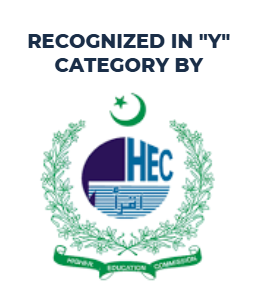
Vol. 2 No. 1 (2023): UCP Journal of Law and Legal Education

UCP-JLLE, Volume 2, Issue 1 contains five articles exploring areas from law, legal practice, administration of justice and legal education in the context of law tech and other technological developments. Afrasiab Ahmed Rana, Fiza Zulfiqar and Salman Masud pen the first paper. The authors explore the intersection of fintech, cryptocurrency, and blockchain in Pakistan, analysing the legal framework, the State Bank of Pakistan's stance, and regulations. The article addresses challenges in regulating cryptocurrency including regulatory uncertainty, concerns about illegal activity, consumer protection, data privacy, and cybersecurity. Authors forward recommendations underscoring the need for collaboration between policymakers and the fintech industry to develop an enabling environment for digital currency adoption. In the second article, the authors Khizar Ahmad, Fatima Sajid, and Wejden Bourkrain study the evolution of cyber warfare in the tech era, highlighting its potential to disrupt the real world. The authors examine the adequacy of International Humanitarian Law (IHL) in addressing the challenges posed by technological warfare. The 'Tallinn Manual’ is discussed for insights into the international law of cyber warfare. The authors underscore the need for IHL’s adaptation to the rapidly advancing technologies, punctuating the absence of a binding international convention governing cyber warfare. The paper written by Shafaq Farooq and Aminah Hussain discusses the evolution of legal education while featuring the crucial role of technology in transforming traditional teaching methods. It emphasises the incorporation of technology in law schools to meet contemporary needs and trends, focusing on the opportunities it presents in legal practice. The study assesses the cultural and structural challenges of implementing technological advancements in Pakistan. In the next article, Sajjad Ali examines the role technology plays in commercial transactions, with electronic signatures (eSignatures) becoming commonplace. The author reviews 'The Electronic Transactions Ordinance, 2002,' validating eSignatures and analyses the admissibility and validity thresholds of both eSignatures and advanced eSignatures in courts. The author also studies the distinctions between the two and evaluates the risks and challenges associated with relying on eSignatures and advanced eSignatures. The last article written by Paras Zafar, Rehana Anjum, and Arun Barkat discusses the persistent issue of delayed justice in Pakistan and emphasises the need for timely dispensation of justice to uplift trust in the administration of justice. The paper explores the origin of eCourts, evaluates the backlog of pending cases, and proposes the practical implementation of a virtual court system at all levels of the judiciary.
We are thankful to the authors for their contributions to Volume 2, Issue 1 of UCP-JLLE and appreciate their patience through the strenuous review process. We extend our heartfelt gratitude to all members of the Advisory Board for their guidance.


